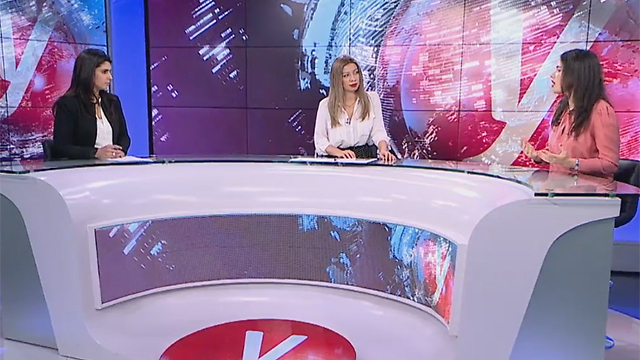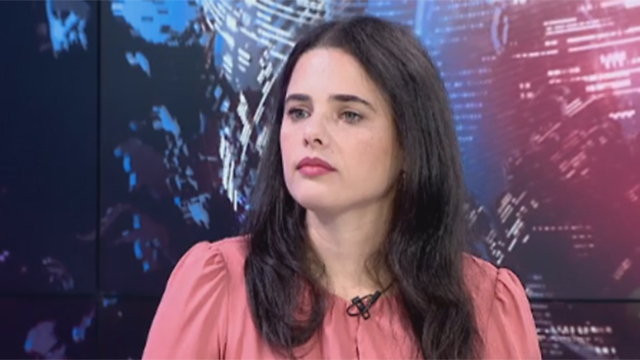

Shaked: PM shouldn't resign based on charges alone
Minister of Justice Shaked tells Ynet 'something extreme needs to happen to dismantle gov't,' adding PM should 'seriously prepare for post-Abbas era' and advising Elor Azaria to 'ask IDF chief for reduced sentence as Supreme Court appeal is hopeless.'
Minister of Justice Ayelet Shaked asserted Wednesday that Prime Minister Benjamin Netanyahu should not have to resign if indicted, only if convicted.
"The law states the prime minister doesn't have to resign. We'll wait and see. There's a lot of misinformation in the media, for example in reports the prime minster or even some of the ministers are embroiled in the submarine affair, which the attorney general declared to be false. At the end of the day, an indictment is served on evidence," she told Ynet in an interview.
Shaked expressed confidence the government would likely survive Netanyahu being indicted. "Something very extreme would need to happen for the government to fall," she said.
"At the moment one hasn't been served. There isn't even a recommendation to indict. The people responsible for making that decision are the state attorney and attorney general. They work in tandem and will be making that decision. Until then – let the prime minster and government carry on working," Shaked added.
Do you think the investigations against him might distract the prime minister?
"When I look at the prime minister in meetings, he's completely focused on the matter at hand. I can't say what goes on outside of government meetings. Each minister manages their own ministry with the prime minister dealing mainly with foreign and security affairs, as far as I can tell. Regardless, in cabinet and work meetings he seems totally focused."
Speaking of the cabinet, what happened during the famous metal detector meeting? Did you fold?
"We thought—Ministers Bennett, Elkin and I—that removing the cameras was a mistake. The police was trying to achieve something, and we thought they need security measures for the Mount. If the police can normalize this new situation to the populace, we should give it the backup it needs.
"Eventually it was decided to remove everything. It was a dilemma, I must say. We thought that folding or removing all of the security measures could in the future lead to harsh consequences. The Middle East definitely proves time and again that folding in the present often leads to calamity in the future."
That may be so, but there were Shin Bet evaluations to the contrary.
"It's true, other security apparatuses were of the opinion the measures should be removed and the decision made is therefore completely within the realm of sensibility. We just disagreed and thought this region dictates a different code of conduct."
Certain figures, some of them in the government itself, claimed the Shin Bet only wanted to "get back home in one piece." Would you a agree with this criticism?
"No, I don't. I think the Shin Bet provided its professional opinion in accordance with the way it viewed the situation. The police and the army did the same. At the end of the day, however, it's up to the government to decide. We've made decisions before that with the passage of time we're now able to tell whether they were good or not. They turned out to actually be very good decisions taken despite objections from the professional ranks."
So current security arrangements may be said to be satisfactory as far as you're concerned?
"No, far from it. And the police agrees with me. We need to consider our options in this regard."
What options are there?
"There was concern that after a live-fire terror attack on the Temple Mount copycats will try to carry out similar attacks. The police therefore needed an immediate solution to the problem, leading it to the metal detectors. It's true the current solution isn't satisfactory. Security presence may have been ramped up, but it's not enough.
"A governmental decision has been made to turn the entire Old City into a smart city; putting up cameras and other security measures all over the city, its periphery and the entrance to the Temple Mount."
Would that stop terror attacks?
"We'll see. That's the decision we made."
Are you in favor of Jewish ascension to the Mount no matter the cost?
"Of course I'm in favor of going up to the Mount. Anyone who's capable of it and wants to, goes up. Both Israeli citizens and tourists ascend to the Mount in an orderly fashion. It should be stated that both groups undergo meticulous inspection. And it should also be said Jews aren't allowed to pray on the Temple Mount. That's an injury to freedom of worship that would never be accepted if it was the other way around. But that's the status-quo at the moment."
The Arab MKs in the Knesset seem to be fanning the flames on this issue.
"The behavior exhibited by Arab MKs is deplorable. They should have been the first to come out and denounce the violence in the strongest possible terms. They should also have denounced the shameful behavior of the people of Umm al-Fahm who disregarded police instructions to hold that funeral of hate. They should have been the first to come out against it, and they didn't. That's deplorable. I do think that in general the Arab-Israeli public wants to be a part of Israeli society.
"And we do our part to invest in the Arab public. I do at my ministry, the Minister of Education does, as do the ministers of agriculture and the economy. We all invest a great deal in the Arab sector to make them a part of Israeli society. Events like the one we witnessed in Umm al-Fahm should be dealt with harshly. It really does start at the top. Unfortunately, the Arab MKs won't distance themselves from this behavior or set a personal example."
The current American administration seems to be pretty motivated to promote some kind of solution. Do you think there's a partner for peace on the other side?
"I think the American government is also slowly coming to the realization that a permanent solution they're seeking for the Israeli-Palestinian conflict isn't feasible anytime soon. And again, I believe the Americans—but mostly we—should start thinking of the post-Abbas era. He won't be around forever and nobody really knows who'll replace him and what happens then. That's something we need to resolve, both Israel and the US."
Should we worry about what happens after Abbas? Will we end up missing him?
"Naturally, it's worrisome. Nobody knows what'll happen in Judea and Samaria. There's the worst case scenario where Hamas will take over the West Bank as well. This is an issue the cabinet and government—as well as security agencies and the prime minister who's also the foreign minister—should address seriously and in detail."
Do you think we're facing an election?
"I don't think so. The government is very stable and works well together, if it wasn't for all the rampant speculations."
It's not just speculation.
"Yes, there are a few things. If it weren't for the affairs, my estimate would be this government seeing its term to the end in 2019. In light of these matters we can't really tell what'll happen. What I can say is that I want to hope the government will finish its term as planned in 2019."
Will you and Naftali Bennett continue in your current platform or are you headed elsewhere?
"Naftali Bennett was voted to head Bayit Yehudi in our primaries. We've completely immersed in the party, developing and expanding it. I sincerely hope new segments of the population will be joining us in the next elections."
Would you want to be prime minister? There are some pretty flattering surveys.
"I'm extremely pleased with the Ministry of Justice. I never rule anything out on principle but at the moment my current position is challenging. I hope to have four more years in it. In the future, anything's possible. What I want to do right now is see my remaining two years in the ministry through and then serve an additional term there."
Elor Azaria – for or against a pardon?
"Azaria should forget appealing to the Supreme Court. If you ask me as minister of justice I don't see that course of action having any hope of succeeding. What he should do is ask the Chief of the General Staff for a reduced sentence. I think that soldier has suffered enough, and that should be taken into account. His trial has been lagging for ages, the entire public affair was divisive and I therefore hope he forgoes appealing to the Supreme Court.
"Such an appeal will just waste more time and do even greater damage to him as well as the army. And I am absolutely of the opinion the Chief of General Staff should take into account all of the circumstances surrounding the case and seriously consider reducing his sentence."

















